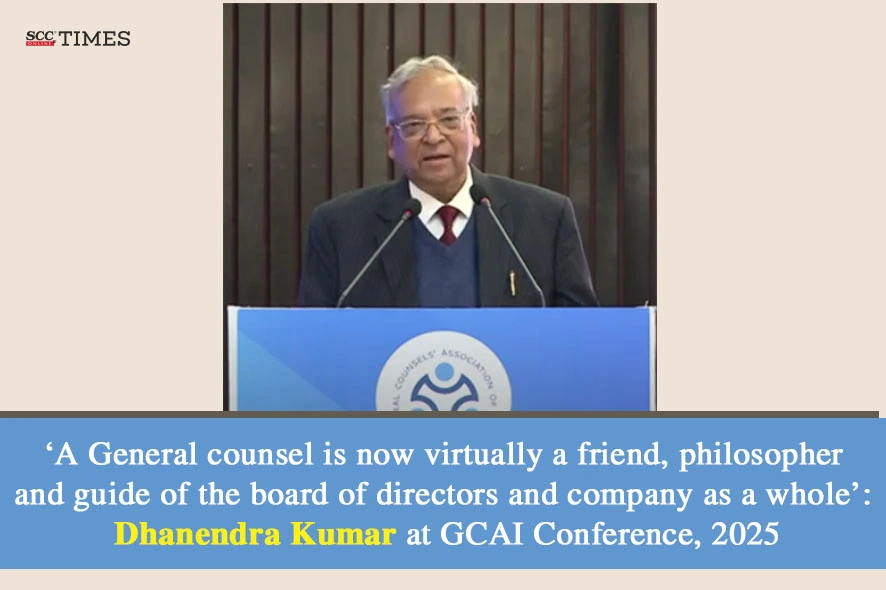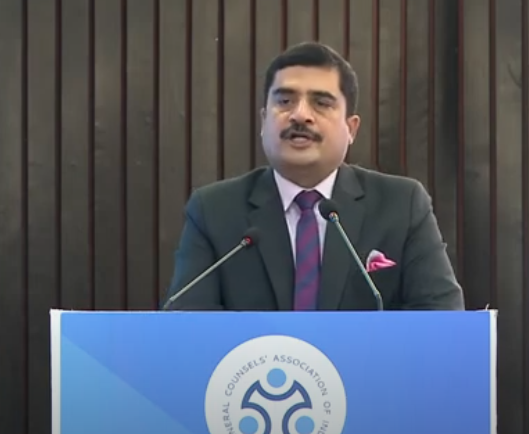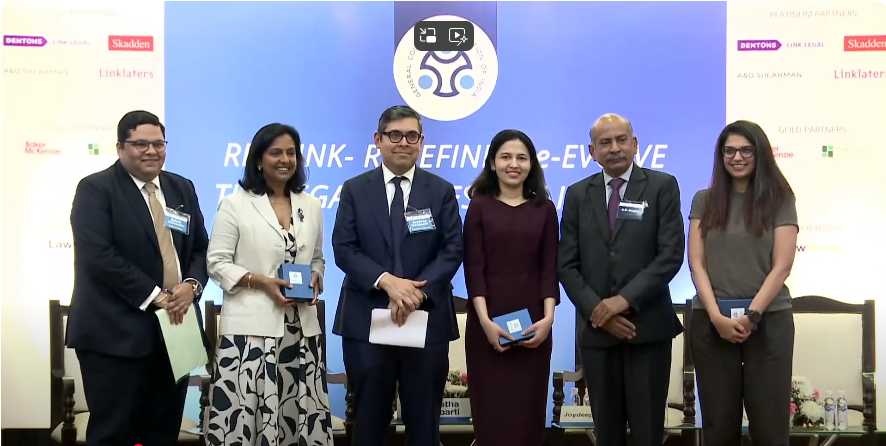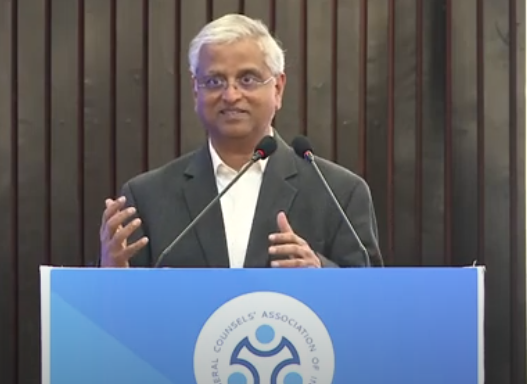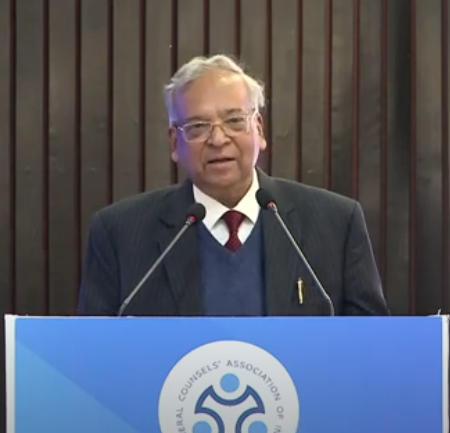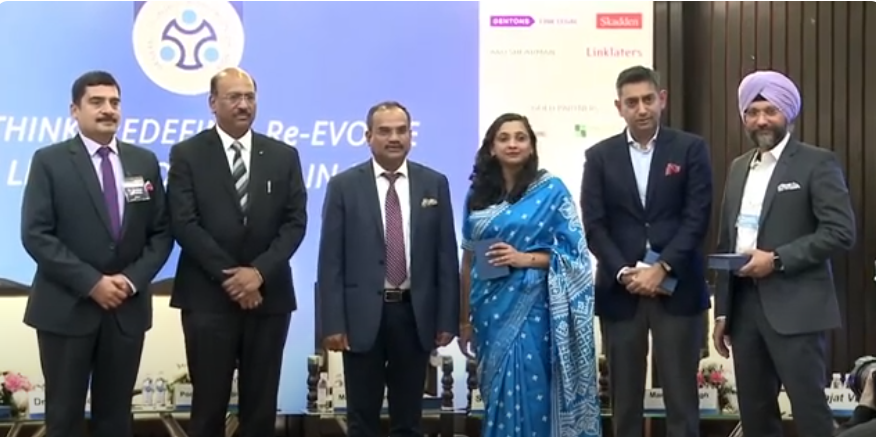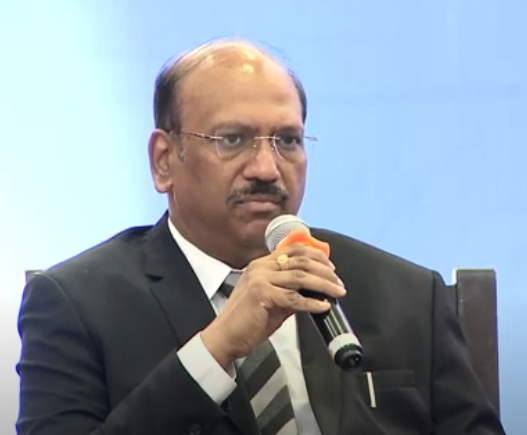The conference began with a welcome address Dr Sanjeev Gemavat, Founder GCAI, Managing Director and Group General Counsel, SR Group. He talked about the need for an evolving legal framework to walk hand in hand with economic growth and changes. He highlighted that it was time for legal practice in India to move beyond its traditional litigations and recognise that law was practiced not just in courts but also across boardrooms. He also underscored the issues faced by in-house counsels due to their non-recognition as practicing legal professionals.
“With India’s increasing Global integration, the demand for specialized non-litigation legal services is growing, yet our legal framework remains narrowly focused on litigation and Court advocacy- a model that is nearly seven decades old and increasingly obsolete”
-Dr Sanjeev Gemavat
The first session titled “What will the Indian Market look like in the next 10 years”, moderated by Ms Ami Parikh, General Counsel, Asian Paints, included panellists namely Ms Sharmishta Chakrabarti, Counsel, Skadden, Arps, Slate, Meagher & Flom LLP; Ms Mini Menon vandePol, Asia Pacific Head, Investigations, Compliance And Ethics Group Chair Of India Practice, Baker McKenzie; Mr Joydeep Sengupta, Partner, Dentons Link Legal, Paris; and Mr Daksh Alhuwalia, Founder and Principal, Aikyim Law Offices.
Ms Ami talked about the growth of Indian Economy and the profession of in-house counsels in that regard. She posed a question to Mr Joydeep in this regard. Mr Joydeep talked about the Indian economy’s increasing integration with the global economy, non-recognition of in-house counsels in India, and French investment in India.
Regarding what kind of regulatory and legislative changes will be required for India, Mr Daksh stated that three-fold changes need to be made in the judicial system,one, the person approaching the courts should have faith in the legal system, second, there should be a certainty of outcomes, and third, the loser pays principle should be adopted.
Ms Ami added that in the foreign investment aspect, the new draft Digital Personal Data Protection Rules, 2025 were fairly vague, which would make implementation harder for companies, and that would be something for the Government to work on.
Continuing the discussion, Ms Mini stated that there were many laws that needed to be implemented for gaining investor confidence. She also highlighted the important role that in-house counsels play for businesses and how there should be protection for the advice that they provide. She underscored that the lack of privilege for such counsels was impacting India’s business abilities.
Thereafter, Ms Sharmishta talked about the role of general counsels and the relationship between foreign and Indian general counsels when they are advising a company. She added that technology and AI in the legal market is right now a tool, but lawyers needed to harness it before it takes over their jobs. She cautioned against false information provided by an AI model like ChatGPT and the concern for client confidentiality. Hence, such tools needed to be used but with several guardrails.
Ms Mini added that there were AI tools for specifically the legal industry. She stated that such tools have been invested in due to concerns of confidentiality and cyber security as well as to save time and money. She explained that indeed such changes would make some legal jobs obsolete, but the legal acumen would still be required, and clients will begin to value such legal input since the grunt work would be done using AI tools.
Mr. Subhash Chandra Garg, former Finance Secretary, Economic Affairs Secretary, and former Executive Director at the World Bank, delivered a keynote address in which he outlined the three key layers of law that corporate and in-house counsels navigate. The first layer, he explained, consists of fundamental laws, such as the Constitution; the second encompasses governance laws, including labor laws; and the third covers compliance and regulatory laws. He also emphasized three core responsibilities lawyers must adopt in their approach: reactive, proactive, and leadership-driven. Finally, Mr. Garg highlighted a concerning lack of initiative from businesses in providing solutions, as well as the burdensome nature of compliance and the challenges associated with government implementation
Another keynote address was delivered by Mr Dhanendra Kumar, First Chairperson of the Competition Commission of India. In his address, he noted that general counsels were expected to guide companies in staying on the right side of the law, but they were not allowed to practice or appear before regulators. Additionally, they do not enjoy the same protections and benefits as other legal professionals. He underscored the essential role of general counsels who were not only the backbone of the corporates bvut also the economy. He concluded by suggesting several solutions aimed at improving the ecosystem for general counsels.
“A general counsel is now virtually a friend, philosopher and guide of the board of directors and of the company as a whole.”
– Mr Dhanendra Kumar
The second panel titled “Futuristic GCs: What will it take and what truly matters” consisted of Dr Rajiv Mani, Secretary, Legislative Department, Ministry of Law and Justice, and Law Secretary, Department of Legal Affairs, Ministry of Law and Justice; Mr Mahaveer Singhvi, Joint Secretary, Ministry of External Affairs; Mr Manpreet Singh Ahuja, Chief Digital Officer, PwC India; and Mr Rajat Banerji, Partner, Deloitte Touche Tohmatsu India LLP. The session was moderated by Ms Poornima Sampath, Senior Vice President and Chief Legal Officer, Tata Digital.
Ms Poornima introduced the session by talking about DeepSeek, recent geopolitical changes in the world, and latest developments that had taken place in India.
Regarding India’s progress with AI and what it would mean for counsels, Mr Mahaveer stated that the Indian Government had realised that the upcoming changes in technology would alter everything, thus, efforts were being made at various levels and in various ministries with the aim of strengthening the governance ecosystem as well as tech diplomacy. He highlighted that on one hand, AI would play a very important role in India’s development and change every sector of the economy, including legal services, but on the other hand, there were concerns regarding AI and its unregulated nature.
Dr Mani added that as far as the legal sector was concerned, the Supreme Court has begun using AI to translate its judgments in various languages. He stated that AI was indeed unregulated and there were discussions in the Government. Pursuant to such discussions, the government was in the process of making a new Information Technology Act that would govern the use of AI in some manner.
From the corporate perspective, Mr Manpreet spoke about how India and its corporates were not moving fast enough. He highlighted how legal counsels are the nerve center for all the legal changes that were happening due to technological changes. He stated that many aspects of legal work needed to be digitised to keep pace with the world and contribute much beyond the legal agenda to the business/organisation. Mr Rajat added that there were many changes taking place due to technological advancements and general counsels were very pivotal in this aspect. He stated that instead of only focusing on business there was now a need to look at the broader corporate governance environment, with a focus on prevention and detection of issues.
Regarding how legislation should be drafted for such issues, Dr Mani stated that when we attempt to regulate any new technology through legislation, we have to be flexible enough to accommodate the changes that may be happening in the way the technology develops and the impact it has on the society, state and citizens. Thus, there had to be a broad base that gave enough flexibility to the government to regulate the various purposes for which the law has been enacted. He stated that such flexibility was required in the field of AI as well since it was overlapping in other sectors as well.
“Initial legislations should be broad-based on the lines of the DPDP Act, giving enough flexibility to the executive to frame rules to deal with various situations that may arise in due course.”
– Dr Rajiv Mani


